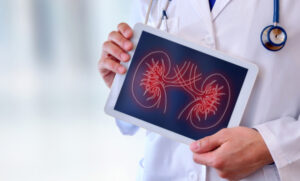Dietary Management of Kidney Disease
Kidneys are known to filter out the wastes from the blood and eliminate them through urine. They help in the regulation of blood pressure, electrolyte balance, production of vitamin D and red blood cells, etc. Kidneys are hard workers which don’t show any kind of signs and symptoms till renal function drops to 30%.

There can be numerous causes of renal failure some of which can be treated and reversed but the remaining cases are irreversible. Unfortunately, in such cases there are no signs of initial stage failure.
Among the numerous causes, treating the disease that caused renal failure may be the first step towards treating kidney disease because in many cases, another health condition or disease puts pressure on the kidney.
Symptoms
When wastes build up and excess fluid accumulates in the body due to renal failure, symptoms like nausea, loss of appetite, sleep apnea, vomiting, fatigue, changes in urination, muscle twitches and cramps, persistent itching, decrease in mental sharpness, swelling, chest pain, high blood pressure, shortness of breath, etc. are observed. Excess potassium in the body leads to abnormal heart rhythms and sudden death.
Causes & Risk Factors
The different causes behind kidney failure include Diabetes Mellitus, hypertension, Glomerulonephritis, Intestinal Nephritis, Polycystic Nephritis, obstruction to urinary tract for prolonged time due to health conditions like kidney stones, enlarged prostate, various types of cancers, acute kidney injury, vesicoureteral reflux (urine comes back into the kidney), pyelonephritis (recurrent kidney function), etc.
Those with diabetes, cardiovascular disease, smoking, obesity, hypertension, family history of kidney disease, abnormal kidney structure, etc. are at higher risk of suffering from kidney diseases. Thus, keeping blood pressure and diabetes under control are very important.
Similarly, once attacked, one can have many other health issues linked to kidneys like decreased immune response, fluid retention, hyperkalemia (excess potassium levels), weak bones and increased risk of bone fractures, affected central nervous system, pregnancy complications, and many more because every organ in the body is interlinked with each other directly or indirectly.
Effect of Pain Killers & Antacids
There are patients whose renal failure is because of over usage of pain killers. NSAIDs (Non-Steroidal Anti-Inflammatory Drugs) can reduce the blood supply to the kidneys and if the kidney functioning has already decreased usage of pain killers is restricted. Heavy intake of these drugs can lead to a disease called Chronic Interstitial Nephritis.
As per a study published in JAMA Internal Medicine, there is an increased risk of developing CKD with increased usage of antacids. Those who use PPIs (Proton Pump Inhibitors) have 20 – 50% risk of renal failure. Antacids can be replaced with natural foods to cure the acidity or heartburn problems while keeping the kidneys healthy at the same time.
Vitamin D Deficiency
Usually vitamin D is low in CKD patients. Thus, doctors generally recommend vitamin D supplements. Kidneys have vitamin D receptors which convert the vitamin D into its active form. Due to kidney failure, this capability is reduced leading to vitamin deficiency. As a result calcium and phosphorus balance is disturbed. PTH (Parathyroid Hormone) levels rise to keep this balance by overcompensation. Thus testing for vitamin D deficiency and PTH levels are recommended.
Dietary Management of Kidney Disease At Aarogyahaar
In most cases kidneys are affected due to long standing diabetes, high blood pressure, over usage of NSAIDs and kidney injury. In addition to CKD (Chronic Kidney Disease) patients have reported to have other problems such as Hypothyroidism, Seizures, Prostate problems, Psoriasis, etc.
It is observed that most of the people consume refined products like white rice, refined wheat flour, refined oils, table salt, etc. Most importantly people take excess protein than required.
After utilizing the required amount of protein or amino acids, the kidneys eliminate the excess in the form of uric acid through urine. When the kidneys stop functioning, this uric acid is not eliminated and stays in the blood which is very toxic for the other organs too. Various types of millets provide adequate amounts of protein and energy.
Potassium also gets excess in the blood and doesn’t get eliminated from the body. Similarly, there are other nutrients which need to be balanced to avoid excess stress or load on the kidneys. This should be done through diet only.
Coming to vitamin D, it is recommended to take in citrate or lactate form rather than carbonate form for better absorption.
Refined cereal products and refined oils cause numerous problems while unrefined cold pressed oils help in reducing triglycerides.
Certain kidney problems can be reversed especially if determined at early stages. In such conditions, utmost care should be given to your diet to prevent severity of this condition.
Foods such as green leafy vegetables, colorful vegetables, beans or legumes, starchy vegetables, fresh fruits, whole cereals, whole fats (ghee, coconut oil, til oil), and water should be take.
The different kinds of symptoms, complications and the main cause that lead you the kidney problem should be considered in order to treat that root cause. At Aarogyahaar, we take utmost care of it considering not only your kidney problem but also other health conditions such as high blood pressure, diabetes, etc.
